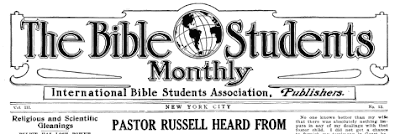Jim S. in the comment trail asked for the source:
THE STORY IS IN THE DETAILS - Notice: I've withdrawn my books from Amazon. They are now only available at Lulu.com
Please visit our newest posts. We'd love to see your feedback. Copyright Secured. Contact blog owner for permission to use anything you find here.
Search This Blog
Contributors
Blog Archive
-
▼
2018
(159)
-
▼
July
(14)
- The Emphatic Diaglott and the Watch Tower Society
- Millennial Dawn Printer 1st Ed.
- Charles J. Peterson
- Transcribing help
- Bible Students in Germany during World War 1
- Posted to Answer a Question from Roberto
- Our post below drifted off topic, but let's continue
- To our recent visitor from Green River, Wyoming
- Your analysis of this quotation
- An extract -
- We need to see these:
- Cedar Point Baptism - 1919
- Comments, Observations, Additional Information ...?
- Music publishing
-
▼
July
(14)
![Falcon's Crown: Kidnapped [e-book edition]](https://blogger.googleusercontent.com/img/a/AVvXsEhkBe00FOeBBmYbVCCTcdazS0iVnLd1WDFAqgsN2RZ54_2mWSQGowpbpnwmDREb-FVVk6AGpaGBEGezxxmeNm1qq65js_RZsBYwu6E6-3ucp3_YQyONvEK3NuIInA3Ru_cqrfm_JizezcrwPiewPQwunSXPJG1OI38N9mQwxOeGd4SvcPUf-DtO7FLMVcg=s238)







7 comments:
Well, it sounds as if either (1) somewhere along the line Maria changed her mind, and Charles was not responsive, (2) her lawyer decided to use that point without Maria's consent, or, (3) Maria herself decided to use the charge, simply because it would be useful to her case.
THe question is, which of the three possibilities (or another, unstated one) is true.
Well, it sounds as if either (1) somewhere along the line Maria changed her mind, and Charles was not responsive, (2) her lawyer decided to use that point without Maria's consent, or, (3) Maria herself decided to use the charge, simply because it would be useful to her case.
The question is, which of the three possibilities (or another, unstated one) is true.
Sorry for the duplicate post.
What is the citation?
If any have trouble reading the date on the graphic that is BSM Volume 3 number 13. (There were 14 issues that year: 1911).
The 1911 quote in the graphic for this post is mainly a restatement of what was said in the Watch Tower for July 1906. Quoting from page 221:
“Mrs Russell’s bill of complaint admitted that there had been no cohabitation between herself and her husband, and her attorney attempted to make out of this that she was deprived of one of the chief pleasures of life. The court would not permit this. The fact is that the matter was in Mrs Russell’s own control. She did understand that her husband preferred to live a celibate life, but she agreed and expressed the same as her preference. She knew…that neither husband nor the wife may “defraud” the other of reasonable marital rights.”
CTR’s explanation also quoted from his own book The New Creation (which came out two years before in 1904) page 512: “After marriage is too late for one to decide for himself whether or not he prefers to live a celibate life. The Apostle points this out most distinctly, declaring that neither the husband has sole control of his own body, neither the wife the sole control of her own body; but that in marriage each has given himself to the other in such a degree that any refusal of moderate reasonable marital rights would amount to an injustice and violation of the marriage contract.”
The whole chapter of New Creation is worth reading as is the special 1906 Watch Tower.
Of course this was not raised anywhere in the existing transcript of the trial from 1906, because this only reveals what went before a jury in 1906, plus some summaries and documents. There were other meetings between the counsels and judge etc. before it ever got to that point going back to 1903 for which no record exists. According to CTR (above), Maria’s original accusation that the celibate marriage was one-sided was not allowed to be part of the case by the judge. Hence the official accusations made by Maria (The Libel) made no mention of this.
When it came to the actual hearing Maria changed tack quite dramatically by going in the other direction and now accusing CTR of physical improprieties with several women. This probably came as a “bombshell” when Maria was on the witness stand since these accusations had also not been mentioned in her complaint. The judge’s summing up directed the jury to only consider what was in the Libel – the other accusations were “beyond the grounds of the libel and has nothing to do with the case, because (of) not being put in”
Two women were cited by Maria. One, Rose Ball, was conveniently (for Maria) on the other side of the world in Australia. So she could not be questioned on the accusations. It should be noted that Rose would have read the blow by blow account of the accusations in the 1906 Watch Tower and remained a loyal Watch Tower supporter with her husband Ernest Henninges for several years. When she eventually left the Watch Tower movement to help Ernest form another one, she never made any accusations as to personal misconduct on CTR’s part, right up to her death in 1951.
Maria’s other accusation to come out of the blue involved Emily Sheesley, who had been a servant in the home. CTR’s defence team managed to locate Emily and bring her into court as a witness. She denied that CTR had ever behaved improperly towards her. Maria’s counsel didn’t even bother to cross-examine her.
Thank you Jerome for providing this valuable additional information regarding the case which debunks the adultery claim. As regards celibacy, I guess this history illustrates that if one wishes to be celibate it is better not to marry in the first place.
Post a Comment